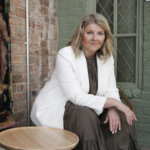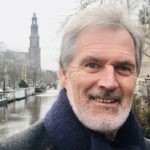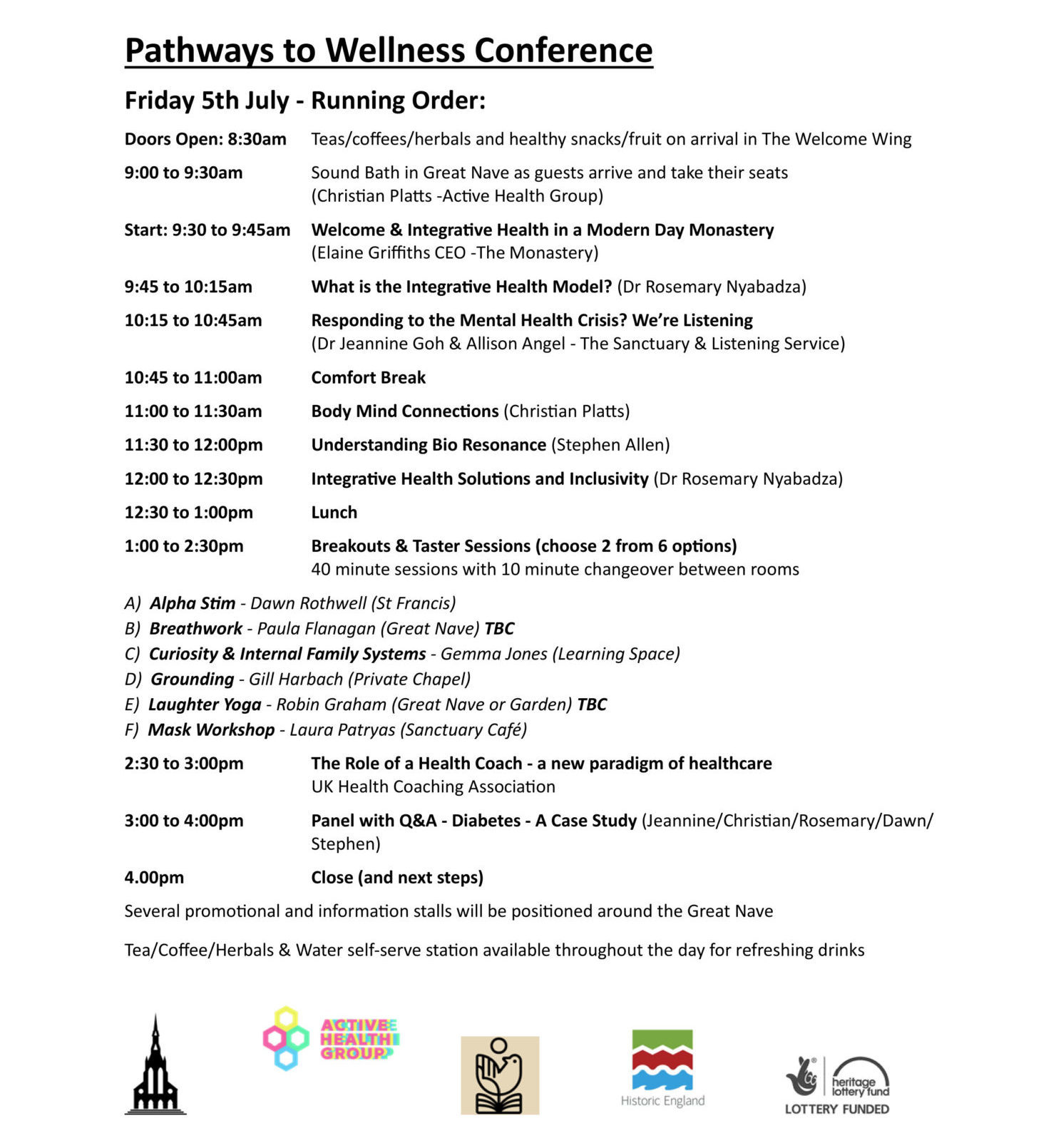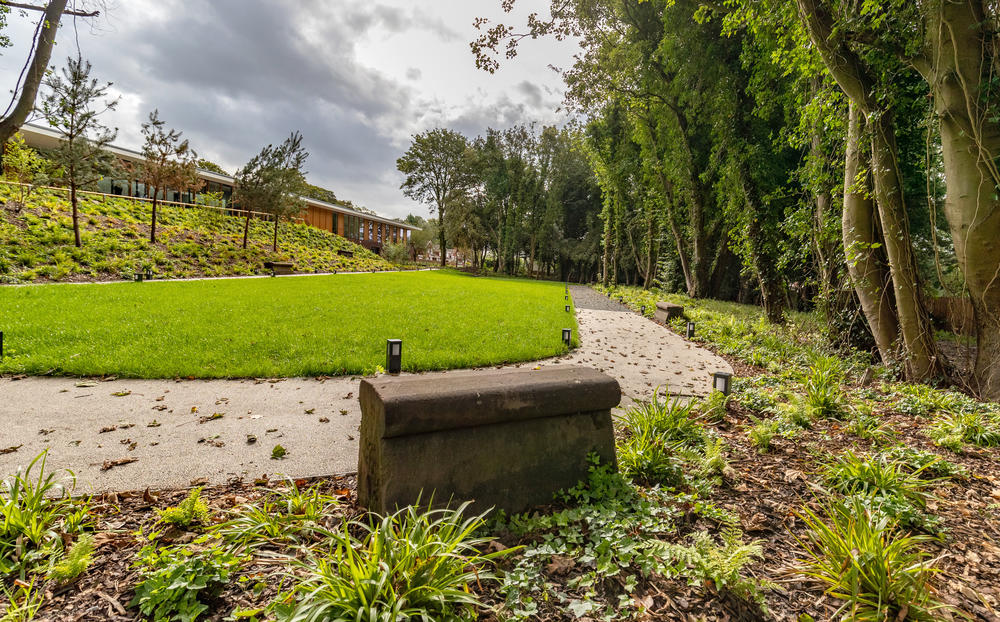Monastery Launches NEW Integrative, Holistic Health Conference
The Monastery is proud to announce our first ever holistic health conference here in Manchester, focusing on alternative pathways to health and wellbeing using a range of integrative approaches.
The date for your diary is 9am – 4.30pm on Friday, 5th July, 2024
Wellness hub
The Monastery is a community wellness hub; home to a wide range of therapeutic activities and workshops with a holistic approach. These include our groundbreaking Listening Service, providing free mental health support in the community; Manchester Camerata’s award-winning Music Café, for people living with dementia; free support for people living with COPD; free treatment for those living with anxiety and depression using innovative Alpha-Stim technology, as well as a range of healing modalities, such as trauma release massage, bio-resonance therapy, and various meditation sessions.
Sharing expertise
Having seen first hand the positive and sometimes, life-changing impact of holistic interventions, the time is right to share our findings with the wider community in the form of an insightful conference, open to all those interested in holistic health and wellbeing. Whether you are a health professional, a wellness enthusiast, or someone curious about holistic health, this conference offers valuable knowledge and practical tools to enhance your own wellbeing, as well as that of your clients.
The conference will take you on a deep dive into holistic health, featuring presentations, interactive workshops, demos, research, and Q&A from experts in their fields, as together we explore the possibilities for the future of health & wellbeing.
Speakers
Elaine Griffiths OBE DL

With a degree in Applied Nutrition and a 20 year successful corporate background as a senior sales executive and marketing professional in the food industry, she has followed that with 28 years charitable experience working in heritage led regeneration.
Elaine has raised over £12 million in grants to save Gorton Monastery and established the Trust’s heritage, health, education, cultural, spiritual and community work here in Manchester. Our Modern Day Monastery is now established as a sacred heritage site, an award winning venue and flexible multi-functional site back at the heart of the community once again.
Elaine is passionate about the healing power and potential of heritage buildings and the potential for sacred sites to support our health & wellbeing. She wants to ensure that we can replicate and share all the learning from the challenges and hard won successes of the Monastery story.
Her personal journey and Monastery experiences have led to other advisory and consultancy roles, including a 5 year term of appointment as Chair of the Manchester Cathedral Council and is currently an appraiser for the 2025 Watch List for the World Monuments Fund in New York.
Dr Rosemary Nyabadza

Parallel to her conventional medical path, her personal journey and its impact on her health opened the doors to the realisation that the wisdom and guidance of practitioners from ancient and embodied traditions have indisputable value. This led to her training as an Integrative Health and Nutrition Coach with Active Health Group, in order to give her the flexibility and freedom to bring a more holistic approach to her work.
Dr Jeannine Goh
Dr Jeannine Goh is a psychologist, lecturer and the Co-Director of The Sanctuary at the Monastery, where she founded and created the pioneering Listening Service.
After struggles with her own mental health in her early twenties, Jeannine has dedicated her life to understanding the internal world and expanding peace of mind. After 25 years of voyaging through academia, psychology and numerous esoteric practices, Jeannine is passionate about supporting others who are struggling, by sharing the life-changing practices she has found.
Jeannine is presently laying a path that allows others to find peace but also abundance, joy and liberation.
Richard Johnson

Richard works mainly using nutritional therapy for clients with chronic health conditions, and is also Principal tutor on the degree level Nutritional Therapy and Health Coaching courses at Active Health Group.
Richard holds fellowships with the Royal Society for Public Health and the Royal Society of Medicine, with specific interest in food and nutrition.
Allison Angel

A social entrepreneur at heart, Allison cares about individuals and communities becoming sufficiently empowered to drive their own development and progress. Her skillset is considerable and wide ranging, thanks mainly to lived experience and a thirst for continuous knowledge and self reflection.
She has specific expertise in business, property and emotional health, and is an advocate for post-traumatic growth.
Allison is a listening pioneer – ready to lead a listening revolution across Manchester and beyond.
Dawn Rothwell

Having worked with many athletes, senior managers from international companies and many health organisations, she has a wealth of experience with all types of health issues and offers treatment at her clinic located in the Pennines.
Christian Platts

Christian developed the UK’s first Myofascial Release Diploma, and Vocal Massage course, and continues to deliver this training. Christian has travelled the world to expand his skills and knowledge and is also a trained Sound Therapist and Breathwork Practitioner.
Stephen Allen

Stephen gained his diploma in osteopathy in 1994 and followed up with postgraduate studies in paediatric osteopathy at the Osteopathic Centre for Children in Harley Street London. His continued studies include homeopathy, acupuncture, psychosomatic training and he has been using bio-resonance therapy for over 27 years.
Stephen’s focus has been on finding solutions for chronic and degenerative conditions including Fibromyalgia and CFS as well as the impact of diet and the potential for nutritional interventions to resolve serious long term health challenges.
Full Programme
Booking & tickets
Tickets cost £55 with concessionary* tickets for £35
*Concessionary rates apply to senior citizens (people aged 60+); disability (those who consider themselves to have a disability); students (in full time education); unwaged.
**Refreshments and an ‘anti-inflammatory’ lunch is included in the price (for specific dietary requirements, please email: [email protected])
Click here to book your ticket
Directions to the Monastery here.




